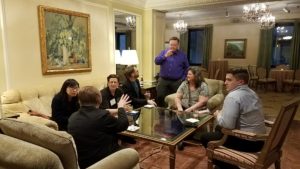Hot topics at 2017 Advanced & Basics
In late June, we wrapped up our 2017 Basics of Sales and Use Tax course in Chicago. In May, we held our 2017 Advanced Sales and Use Tax Workshop in Scottsdale, Arizona. As happens every year, I was blown away by the insights, questions and comments from the attendees at our two in person events.
What did I hear from this year’s attendees? What are the topics that are keeping them up at night, the topics that they’re discussing with their colleagues and bosses? Well, we covered a lot of ground, but there were 3 big issues that I found coming up again and again, and with good reason. Here are the topics that the Sales Tax Institute faculty and I spent a lot of time discussing with the attendees.
1. Nexus in 2017
As you know from our News & Tips, blog posts and Remote Seller Nexus Chart, nexus is the hottest sales tax topic right now and will likely continue to be for some time. In fact, a number of remote seller nexus legislation became effective on July 1 with some also challenged or delayed.
At our events, we discussed the recent spate of reporting requirements legislation and how some states – Colorado, Alabama, Vermont – have penalties for non-compliance. For states that are assessing penalties, you have 2 choices: comply or voluntarily register to collect and remit sales tax. We spent a lot of time debating the pros and cons of each of these options. There isn’t one answer for everyone – as the facts of each company need to be evaluated.
There has also been an influx of economic nexus legislation enacted in 2016 and 2017, so that’s on everybody’s radar. But economic nexus legislation is being challenged left and right, so it may be wise to wait and see how the legal challenges pan out. As an example of how quickly things can change, Massachusetts issued a directive with economic nexus requirements on April 3 but proceeded to revoke the directive on June 28 before it could become effective and after a lawsuit was filed challenging it..
With the different types of nexus legislation that states have passed and will continue to pass, it’s getting more and more challenging to avoid nexus. Be aware of what’s going on out there, think it through and look at your business to determine what the best plan of action is.
All of the above is happening on the state level, but I’d be remiss if I didn’t bring up federal nexus legislation. Who knows what will happen here? At both Advanced and Basics, I remarked that I think the Federal Congress may have more important things to tackle right now than federal nexus legislation. Then what do you know, President Trump tweeted about that very topic. Does this mean it could become a priority?

Colorado has stayed on its own path – from introducing and withstanding the challenge on the Reporting and Notice legislation to zero participation in the Streamlined Sales Tax Agreement. But they have announced a simplification task force. If federal remote seller legislation passes, states would be required to have some level of simplification. Does that mean Colorado thinks federal legislation will pass? Things could get interesting….
2. Audits
We took a deep dive into audits at this year’s Advanced workshop during the “Effective Audit Defense Techniques” section. We also explore audits in-depth at the Basics course. As anyone who regularly deals with sales tax knows, audits are something we think about often and deal with on a hopefully not-too-often basis.
A common theme we explored and heard about from attendees and faculty was that states are becoming even more aggressive with audits as they are looking for additional tax revenue. They are looking at areas that haven’t been an issue in prior audits – even when nothing else has changed with the business. There are things you can do to be better prepared in case the auditor comes knocking. Here are three helpful tips:
- Be Audit Ready – Always be thinking about documentation and what is needed to support your tax calculations and tax returns. And obtain, retain and maintain documents including exemption certificates, invoices and contracts.
- Know Your Business – Understand what your business does – in all divisions that are included in the audit. This includes knowing where your business operates and what happens in each location.
- Know the State and its Audit Processes – Be comfortable with the laws that apply in the state to your business. Understand the exemptions that apply and if there are special rates or rules that apply to your business. Also, know what the statute of limitations is and-how far back an audit can go.
And fight back! Don’t just accept what the auditor says. Research, talk to others, and make the auditor support their assessment. Become an audit warrior!

3. Administering the Sales Tax Function
We talked a lot about sales tax administration at this year’s Advanced workshop across a number of topics – How to Stay Sales Tax Compliant, Managing Exemptions for Purchasers & Sellers and How to Conduct Tax Research Projects. These are topics we also cover at Basics. What I love about teaching at our Advanced Workshop is we can dig deeper into the topics and really flush out ideas and how to apply the issues to everyday life for our students.
During the Tax Research session, we discussed the importance of knowing the best way to conduct tax research in order to make sure you’re finding the right answer. We also covered how to apply the answers you find to your business and how to communicate tax rules throughout the company. This is vitally important for the sales tax professional, as doing tax research the right way can lead to tremendous time and money savings as well as fewer headaches for everybody involved. But as I always like to say – sales tax is a team sport. If you can’t communicate the rules in a way that others in your company understand, you can’t win at this game. We talked about really understanding the users and how different delivery methods can impact how well the rules are applied throughout the business.
No one person can take on sales tax administration alone. You need a team in order to help you execute and administer the sales tax function correctly.

I had such a great time at this year’s live courses. The Advanced Workshop and the Basics course really are the highlight of my year since I get to engage with students in-person, address their most pressing questions, and hopefully provide some insights to help them succeed in their career. Thanks to all the great faculty members including BJ Pritchett, Jennifer Zimmerman, David Hughes and our newest faculty member Julie Skelton Townsley. And a big shout out to all the attendees who contributed so much to the experience.
 About the Author:
About the Author: